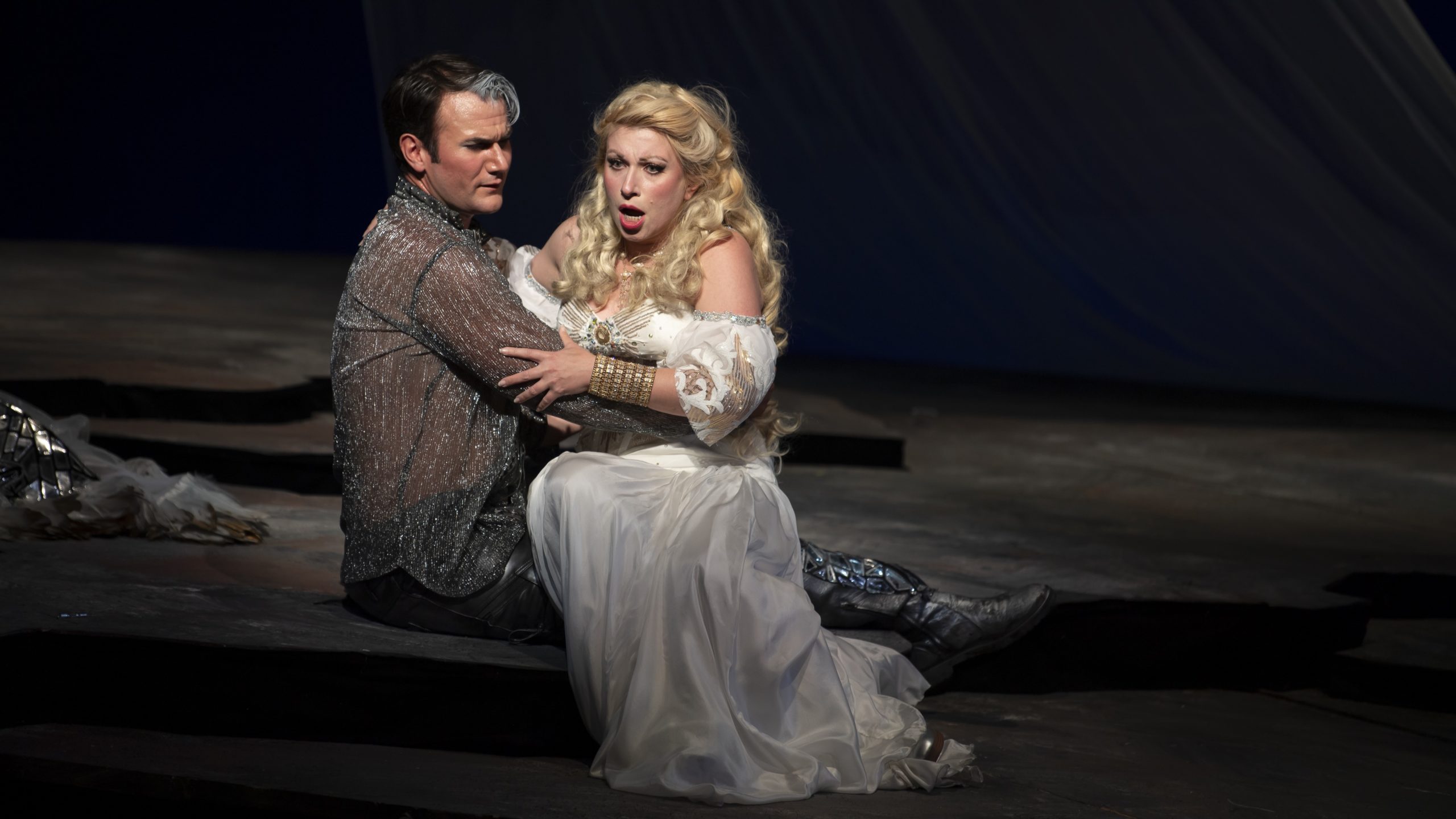LOGAN — All children are raised on fairy tales by the Grimm Brothers: tales of dark German forests, where princesses like Rapunzel and Sleeping Beauty wait to be rescued by a handsome prince. Watching Lohengrin at the Utah Festival Opera and Musical Theatre was like watching a fairy tale that felt as familiar as Cinderella, but was completely new at the same time. Richard Wagner’s classic opera had its world premiere in Weimar in 1850, and after 173 years it is finally making a Utah premiere at the Ellen Eccles Theatre.
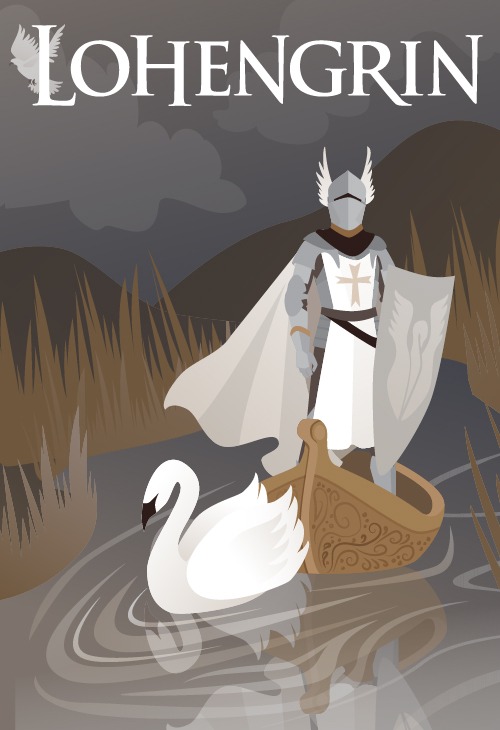
Before the curtains ever open, the scene is set first by the orchestra under the master direction of conductor Andreas Mitisek. Under Mitisek’s baton, Wagner’s composition evokes the mental images of a lush German countryside. The curtain rises to reveal a tilted, rocky platform surrounded by people prepared for battle. A trumpet rings out from the balcony and heralds the king with resounding acoustics and calls everyone to attention. King Heinrich der Vogler (played by Brandon Coleman) has assembled the German tribes to settle a dispute over who should rule over the land of Brabant. Mallory Prucha’s costume designs are brilliant throughout the opera and speak volumes about the character before they begin to sing. With billowing robes and a subtle crown, Heinrich’s authority is obvious. Coleman’s rich bass voice commands the scene as he demands answers from the gathered nobles about the disappearance of the child, Duke Gottfried of Brabant.
Stepping forward to answer is the elderly guardian of the boy, Count Friedrich von Telramund (played by Brian Montgomery). Dressed in black with red straps and buckles, he is the obvious antagonist and obviously wants to gain the Duke’s lands for himself. Montgomery’s baritone voice is powerful and tense as he accuses the Duke’s older sister, Elsa, of killing the young boy.
Elsa is played by Joanna Parisi, who has an astounding soprano with her radiant high notes that gleam luminously onstage. Her command of her instrument is dazzling. Dressed in a white gown that flares into an ombre pink at the bottom, she is bound by her handmaids with long strips of cloth. The image is striking, showing her to be the embodiment of a damsel in distress as she laments her brother’s fate.
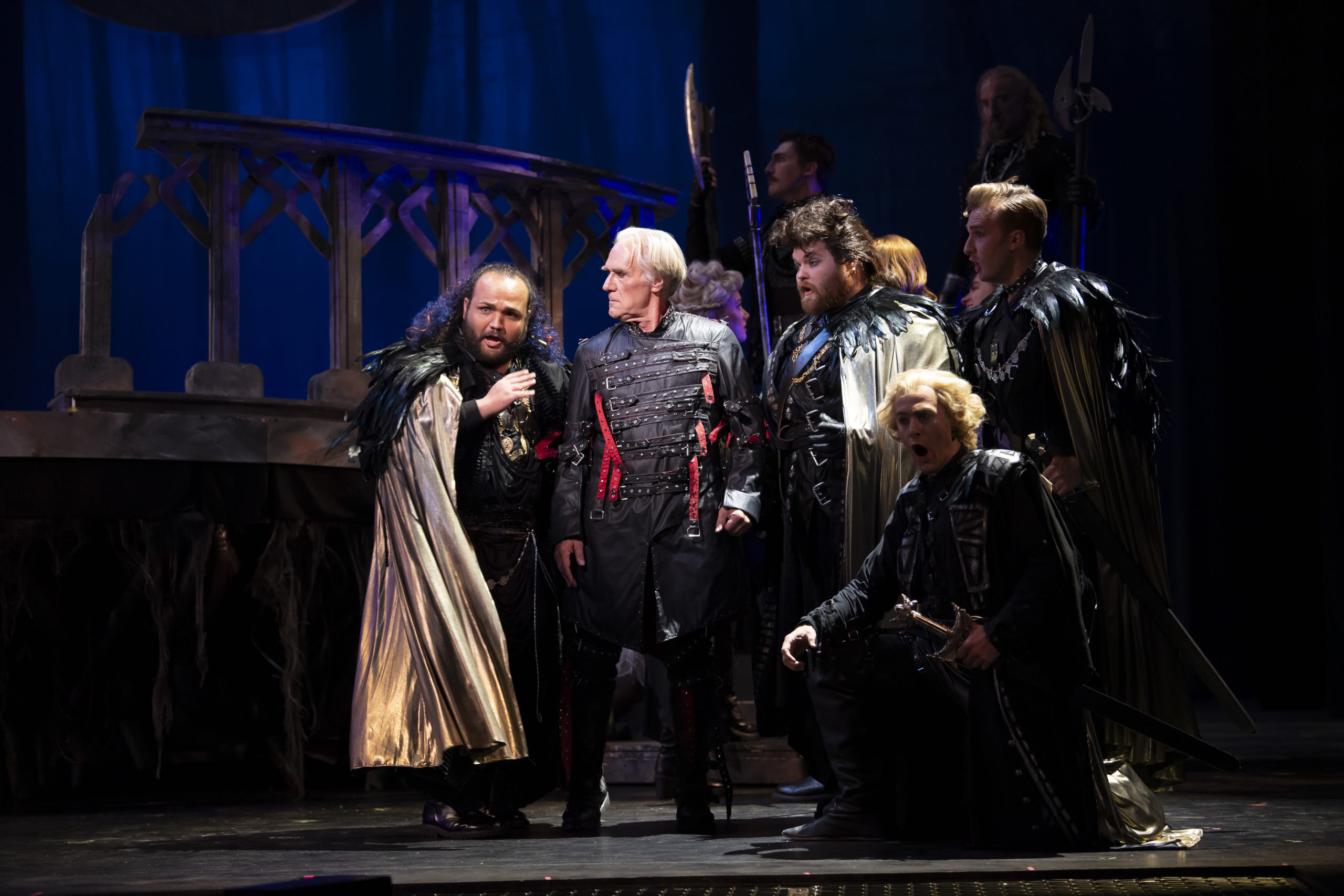
The king demands that God’s judgment be granted through trial by combat — Telramund fighting whomever Elsa calls to be her champion. She prays for the man of her dreams to come and save her in a heart wrenching aria. The set design by Patrick Larsen combines beautifully with projections designed by Sydney Sousa as a swirling vortex of magic opens a portal for a knight in shining armor to enter the stage with symbolic feathered pauldrons to show he was led by a swan to poor Elsa. The mysterious knight is played by Edward Brennan, who has a warmth and charisma to his tenor performance which makes it easy to love him as much as Elsa does. The knight will gladly fight for his lady with the one stipulation that she can never ask him his name or anything about where he came from.
Reinforcing the familiar feel of this tale, audiences will notice that the wedding of Elsa and the Knight is celebrated during “Treulich gefuhrt” or “Bridal Chorus,” which is the song most of people think of as “Here Comes the Bride,” and is associated with the bride walking down the aisle in many western weddings. (I was surprised that this opera is where the standard wedding song originates.) The chemistry between the knight and Elsa is strong and their wedding night duet is achingly beautiful.
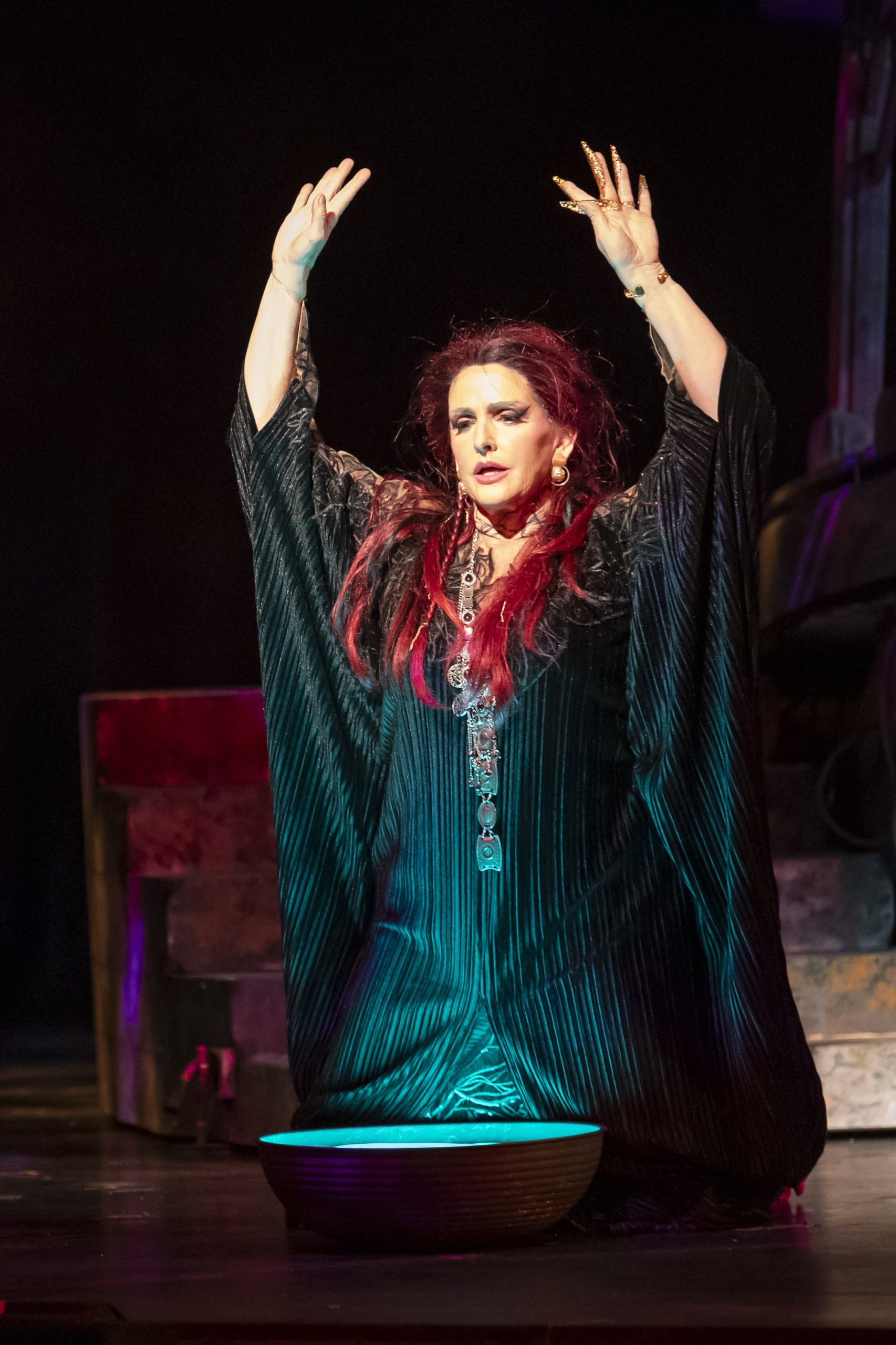
Unfortunately, their love will be foiled by the wife of Telramund, Ortrud (played by Nina Warren). Superb costuming sets Ortrud apart from the beginning of the show. She starts as a woman in red, showing she slipped in as Telramund’s wife by less honorable means. Later she appears in a black gown and is working some kind of black magic to seek revenge on Elsa and the knight for defeating her husband and ruining his reputation. She ends in a gorgeous gown that looks like black twigs and branches reaching up from the hems as she calls upon her heathen Gods of Wodan and Freia in a powerful mezzosoprano.
Director Suzan Hanson has masterfully helmed the production to bring all the elements of a stunning performance together. The technical elements of the performance are flawless. Costumes, props, set and projections are all of the highest quality, but the star is always the music. Each singer, from the title role to the chorus, is phenomenal. The performance of a full live orchestra cannot easily be conveyed in the written word. I was transported to another time and space where places were painted in tones and thoughts and feelings were expressed through music.
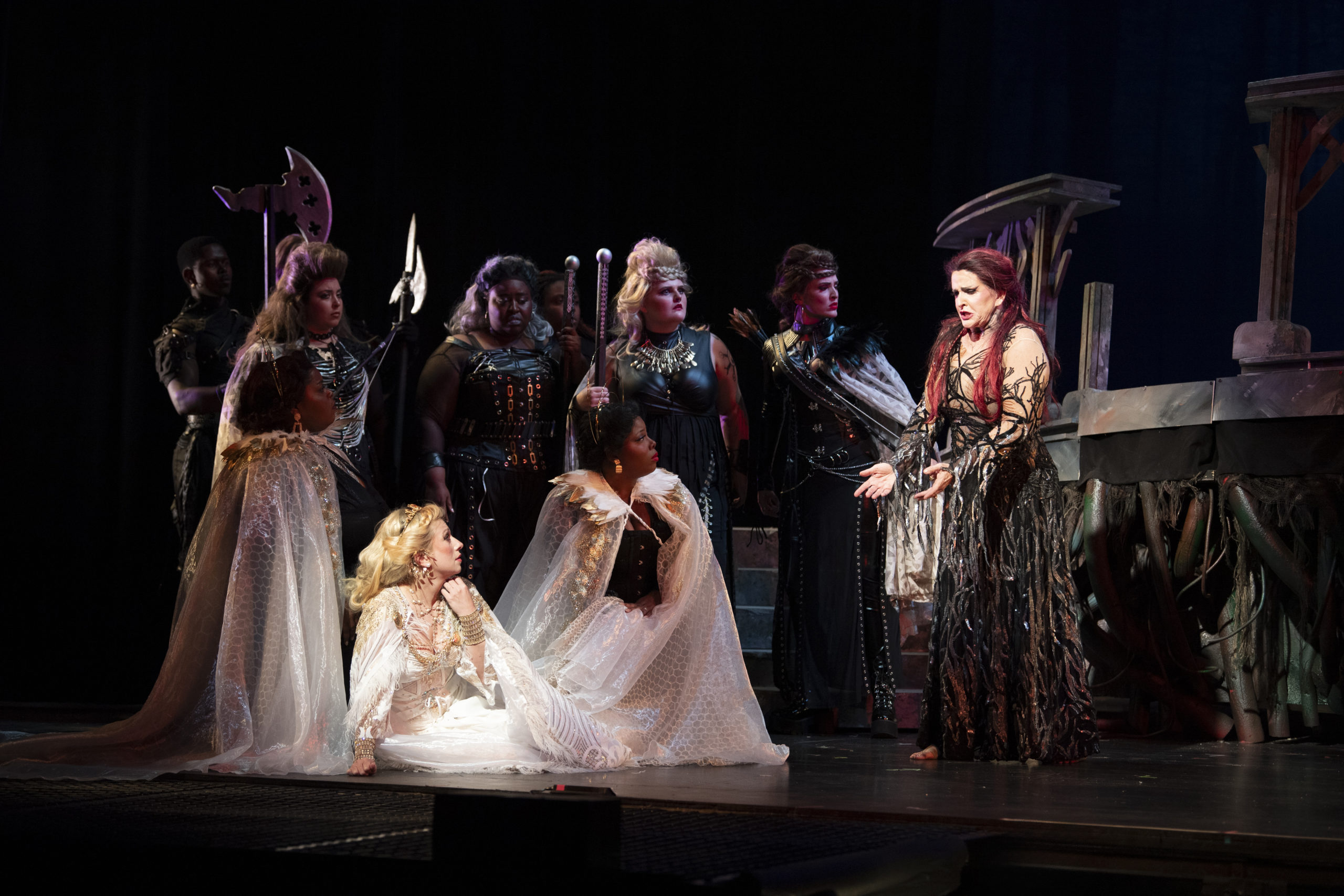
I hope no potential patron will shy away from this show. Opera or Shakespeare, if done well, can be easily understood even if you are unfamiliar with it. This production of Lohengrin makes the show even more accessible by projecting English subtitles for the German lyrics. The show left me pensive from the themes it brings up, particularly the stark contrasts between Elsa and Ortrud throughout the show. Good verses evil. Christian verses pagan. The assumed “wrongness” of a woman’s desire for “forbidden knowledge.” (In this case the name of your husband and where he comes from.) The idea of the pure, virtuous woman who only wants to serve her man verses the tarnished sorceress who is unnatural by leading her husband in their plots. Some of Wagner’s morality themes to his fairy tale may seem antiquated by modern standards, but the way it is told is just as beautiful as ever. The whole night was a pleasure because it felt new and excited, but also familiar. Most of all, I was in awe of the talented artists on the stage, in the pit, and behind the scenes.
Michael Ballam says that the mission statement of the Festival is “elevating lives through ennobling artistic experiences.” This performance of Lohengrin certainly achieves that goal in every way, and I think it would be a good experience for anyone willing to try something both new, and old.
[box]The Utah Festival Opera and Musical Theatre production of Lohengrin plays at the Ellen Eccles Theatre in Logan on July 5, 15, 21, 28, and August 3 at 1 PM or 7:30 PM. Ticket are $23-$89. For more information, visit utahfestival.org.[/box]

